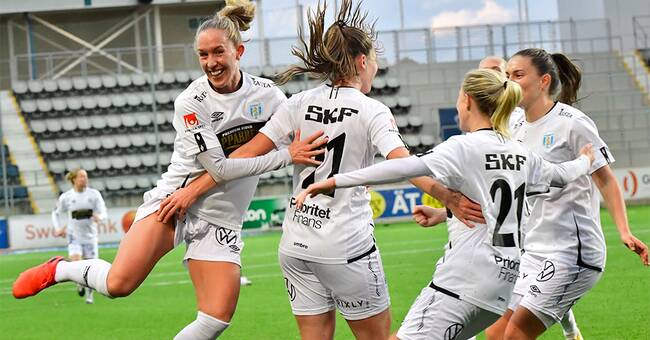When the new contracts were signed for Jennifer Falck, Elin Rubensson and Johanna Rytting Kaneryd, among others, they wanted to know that "if we win Swedish Championship gold but see that we are not enough in the Champions League, we will end the project with immediate effect".
Then they would have had fair conditions before they signed a Kopparberg contract.
To come up with this message now is neither responsible towards the employees nor towards Swedish football.
Especially not as the reigning Swedish champion.
In that role, the club has a responsibility for the product Swedish women's football.
This message erodes the product, both in the short and long term.
Who takes over in Gothenburg?
How many years does it take before IFK Gothenburg, Örgryte IS or a BK Häcken can take over at that level - as a champion team in the Damallsvenskan from Gothenburg?
Or are there plans in the background for a faster way through the series system?
The players who are in the squad today and who want to continue at the highest level will have left town for a long time.
The success of Kopparberg Göteborg FC has certainly increased interest in football and contributed to more Gothenburg girls starting to play football.
But to think that this project has otherwise contributed to a mentality, that women's football in Gothenburg can at least if they try, feels weak.
Rather, it sends the signal that Gothenburg teams cannot compete over time with the best.
And girls' football's new talents are set without local role models.
I have full respect for the fact that Peter Bronsman and Kopparberg do not want to pump more money into the project Kopparberg Göteborg FC as the driving force seems to have been Swedish Championship gold and especially Champions League games.
Bronsman has invested large sums and contributed to development.
But when he saw the gigantic difference between Manchester City and his KGFC on December 16, he seems to have realized what large sums will be required to compete with the top teams in Europe.
The connection between finances and results over time cannot be overstated.
Neither motivation nor wallet is enough anymore.
At least not in Gothenburg.
Good so.
It is good to thank oneself and step down from the throne as Gothenburg's most powerful sports personality (Göteborgs-Posten 2020), Bronze Man.
Does the entire elite business need to keep up?
In any case, it does not seem to be an immediate financial crisis in Kopparberg Göteborg FC because the association guarantees to pay salaries and take responsibility for current contracts.
Either it was Manchester City who hit the nail in the coffin or there is another trigger in this story.
On December 17, the board made its decision.
I also wonder if it is a decision for the board's four members to make?
What has happened here raises questions about the association's organization and what the members' voices are.
Because it is an association democracy and not an ownership we see in Kopparberg Göteborg FC?
Is this really a shining example for advocates of the 51% rule and union democracy?
What we see is what can happen if a sole proprietor is too strong and the association's organization is too weak.
We see the difficulty in dealing with dropouts from heavy partners and the vulnerability when the owner gets tired.
Is there no one in the club who wants or can go into the next season as the reigning Swedish champion?
The truth is that Swedish women's football can no longer compete with the biggest clubs in Europe - over time.
Whether it is an independent women's football association or as part of an association constellation with women's and men's activities.
And to argue that it is the big clubs' responsibility in the future shows deep ignorance about the challenge of getting the economy together in these clubs, in today's football.
That the money would be available for a women's investment in Europe is a utopia.
As is well known, the Swedish men's clubs do not stand out in the European competition either.
Three goals for survival
The project Swedish women's football would jointly invest in should, in my opinion, have three goals.
1) To become a leader in delivering well-trained top players.
2) To sometimes produce a club team that competes at the very highest level.
3) To get returnees to damallsvenskan who together with talents means that damallsvenskan maintains a sufficiently high level.
To succeed in this, women's football needs, among other things, to bring in larger transfer sums in its business.
But then completely different investments than today are required in the training activities for future players, to provide conditions with facilities, plans and other support functions around the young talents.
It would be a much more interesting project to develop women's football than closing down Kopparberg Göteborg FC.

